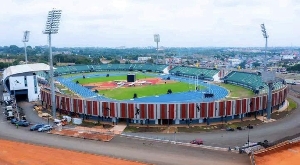- Home - News
- TWI News | TV
- Polls
- Year In Review
- News Archive
- Crime & Punishment
- Politics
- Regional
- Editorial
- Health
- Ghanaians Abroad
- Tabloid
- Africa
- Religion
- Election 2020
- Coronavirus
- News Videos | TV
- Photo Archives
- News Headlines
- Press Release
General News of Tuesday, 11 December 2001
Source: Chronicle
Protests, as Selormey goes in for 8 years
The spontaneous jubilation which greeted the pronouncement of the conviction of Victor Selormey, former Deputy Minister of Finance, by the crowd at the premises of the Fast Track Court yesterday quickly turned into rowdy protestations and threats of violence when it was later learnt that the convict had been sentenced to only eight years’ imprisonment.
The massive crowd, in a unanimous disapproval of the sentence, which they claimed was too mild when compared with the four-year jail term imposed on Malam Isa, the former Youth and Sports Minister who misappropriated $45,000, zoomed into the courtroom to have their pound of flesh from Selormey.
For more than 45 minutes after Justice Samuel Baddoo had handed down the conviction and the sentencing and had bowed out of the courtroom, the Police Striking Force Unit could not handle the crowd milling around the convict.
They had to call for reinforcement from the Police Headquarters to beef up the contingent before they managed to whisk away Selormey, who, Chronicle learnt, is now in transit at the Police Headquarters.
The protestors in a fit of anger booed and shouted “julo, julo” at Selormey, as he was being driven away to begin his eight-year jail sentence in hard labour.
He was found guilty on all the six counts of causing financial loss to the state, conspiracy and defrauding by false pretence.
Sentencing Selormey, the judge said on the first two charges, he was giving him four years on each, which has to run consecutively, and on the remaining four charges, he asked the convict to pay a fine of ?10 million within 12 months, which must run concurrently, or in default serve two years’ imprisonment.
The court also ruled that the convict and Mr. Frederick Owusu Boadu, President of Leebda Corporation, made a false representation on the court computerisation upon which the amount was paid to him.
He said the two persons would have to refund more than $1million to the state.
The court, therefore, asked the state to initiate civil action to get the money back.
Justice Samuel Baddoo, aware of the stir and protestations that would erupt on his decision, had earlier on in his judgement made it categorically clear that in a criminal case, every case must be approached on its merits, in apparent reference to the Mallam Issa case.
He conceded that the amount involved was very huge, more than ?9 billion and thus the convict deserved a more severe punishment, but explained that the court took into consideration the health of the convict.
The convict has a pacemaker inserted in his body, which basically assists his heart to function and the device needs to be charged constantly, Chronicle learnt.
According to the judge, Selormey could have taken advantage of the restitutions and the compensation, which he did not and therefore the court was bound to impose sentence, however taking into consideration that he has a pacemaker in him.
The judge said he found the accused guilty of the charges because from the evidence adduced by the prosecution witness, he came to the conclusion that there was no contract signed between the Ministry of Finance and the Leebda Corporation, adding that the CD-Rom and the contract document tendered in by the accused was self-serving and calculated to mislead the court.
On the charge of misrepresentation, he said that the court found out that Leebda Corporation did not perform any services to the state but the accused made a false representation to Ecobank, authorising the transfer of over $1.2 million to Leebda Corporation.
Touching on the conspiracy, the court found out that there was sufficient evidence to support the charge.
He said the accused and Dr. Fredrick Owusu Boadu were acting together, and noted that evidence showed that it was only the accused and Boadu who signed the contract of such a huge amount of money without a witness and that they had cited the contract .
On the charge of causing financial loss to the state, the court said that as far back as 1999, Dr. Boadu had received the cash and that if there was a contract there would not have been any dispute.
The court said that after every consultancy service a report is produced, but the accused did not produce any report to the Ministry of Finance or the implementing agency .
The judge, in his two-hour judgement that began with the summarising of the case and highlighting of the evidence of both prosecution and defence witnesses, said counsel for the accused in their address failed to attack the evidence of the prosecution witnesses.
Justice Baddoo said that the Legal Sector Co-ordinating Committee, which was the implementation committee, awarded the contract to VSM International and that they were paid.
He said that neither the implementation committee nor the Auditor General and the Controller and Accountant General were aware of the existence of the contract.
The court also noted that the charges preferred against Selormey had no defect because reasonable information was made available to the convict and therefore he would not therefore dismiss the charges.










